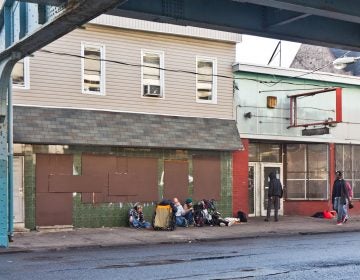Beyond South Philly Acme, hepatitis A is on the rise
Philadelphia now sees more than 30 cases of hepatitis A a year, about five times more than just two years ago.

Shown is the skyline in Philadelphia along the Schuylkill River, Tuesday, April 9, 2019. (Matt Rourke/AP Photo)
Editor’s note: This article has been updated to include three reports of hepatitis A exposure in Delaware.
—
A hepatitis A infection contracted by a food handler at a South Philadelphia Acme supermarket highlights a recent rise in the prevalence of the disease in the region.
Philadelphia now sees more than 30 cases of hepatitis A a year, about five times more than the baseline just two years ago. The viral liver infection is also showing up in people who don’t have any of the known risk factors, said Steven Alles, director of the Division of Disease Control at the Philadelphia Department of Public Health.
That appeared to be the case, Alles said, with the worker at the Acme on East Passyunk Avenue. Last weekend, shoppers who bought freshly cut fruit and vegetables there between March 17 and March 29 were warned that they might have been exposed to hepatitis A.
In Delaware, meanwhile, state Division of Public Health officials have reported staff and diners were potentially exposed to hepatitis A at three restaurants: the Stone Balloon Ale House in Newark, between March 20 and April 3; Buffalo Wild Wings in Bear, between March 21 and April 12; and Buffalo Wild Wings in Middleton, between March 28 and April 10.
The virus is transmitted through fecal contamination. Groups considered at increased risk for infection include men who have sex with men; drug users; people who are homeless; and travelers to countries where the disease is more prevalent.
Alles said only of a handful of the recent infections in Philadelphia were tied to any of those risk factors, however.
“There’s quite a bit more hepatitis A virus out there now,” Alles said. “There is an increasing risk.”
Outbreaks of hepatitis A have swept across the country in recent years, sickening a total of 15,000 people since 2016, according to the Centers for Disease Control and Prevention. They have mostly affected people who are homeless or use drugs, cropping up in states as distant as California and New Hampshire.
Other places, including Philadelphia, have had smaller spikes. New Jersey’s Camden, Gloucester, and Burlington counties reported an uptick in hepatitis A cases in the first months of the year.
Symptoms of hepatitis A infection include fever, vomiting, diarrhea, and jaundice, according to the CDC. Most people recover without lasting liver damage, but it can cause death and liver failure in rare cases, the CDC said. In the recent national outbreaks, 140 people have died.
Philadelphia health officials have been working to prevent a larger outbreak here. Alles said that, so far, it’s working. Since last summer, the Health Department has vaccinated about 450 people whose homelessness or drug use makes them more vulnerable.
So far, there are no signs that the Acme Markets worker infected anyone else, Alles said. The Health Department recommends that patrons of the East Passyunk Avenue store who were potentially exposed get the hepatitis A vaccine if they haven’t ever had the disease or received two doses of the vaccine in the past.
Alles said people who aren’t sure whether they’ve had the vaccine should ask their medical providers. It’s only recently been recommended as a routine immunization for children, Alles said, so most people who aren’t at high risk probably haven’t been vaccinated.
“If there’s no record of having it, folks should seek vaccine,” he said. There’s no harm in getting an extra, unnecessary dose, he noted.
WHYY is your source for fact-based, in-depth journalism and information. As a nonprofit organization, we rely on financial support from readers like you. Please give today.





